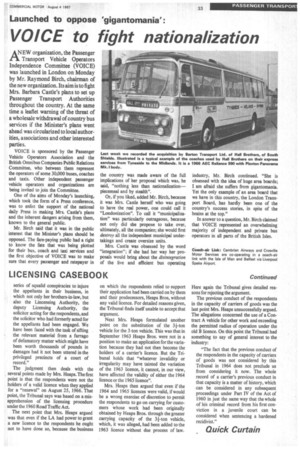LICENSING CASEBOOK
Page 35

If you've noticed an error in this article please click here to report it so we can fix it.
series of squalid conspiracies to injure the appellants in their business, in which not only her brothers-in-law, but also the Lincensing Authority, the deputy Licensing Authority, the solicitor acting for the respondents, and the solicitor who had formerly acted for the appellants had been engaged. We have been faced with the task of sifting the relevant material from a farrago of defamatory matter which might have been worth thousands of pounds in damages had it not been uttered in the privileged precincts of a court of record."
The judgment then deals with the several points made by Mrs. Heaps. The first point is that the respondents were not the holders of a valid licence when they applied for a "renewal" on August 25, 1966. That point, the Tribunal says was based on a misapprehension of the licensing procedure under the 1960 Road Traffic Act.
The next point that Mrs. Heaps argued was that even if the LA had power to grant a new licence to the respondents he ought not to have done so, because the business on which the respondents relied to support their application had been carried on by them and their predecessors, Heaps Bros, without any valid licence. For detailed reasons given, the Tribunal finds itself unable to accept that argument.
Next Mrs. Heaps formulated another point on the substitution of the 3fton vehicle for the 3-ton vehicle. This was that in September 1963 Heaps Bros. were not in a position to make an application for the variation because they had not then become the holders of a carrier's licence. But the Tribunal holds that "whatever invalidity or irregularity may have tainted the variation of the 1963 licence, it cannot, in our view, have affected the validity of either the 1964 licence or the 1965 licence".
Mrs. Heaps then argued that even if the 1964 and 1965 licences were valid, if would be a wrong exercise of discretion to permit the respondents to go on carrying for customers whose work had been originally obtained by Heaps Bros. through the greater carrying capacity of the 3i-ton vehicle, which, it was alleged, had been added to the 1963 licence without due process of law. Here again the Tribunal gives detailed reasons for rejecting the argument.
The previous conduct of the respondents in the capacity of carriers of goods was the last point Mrs. Heaps unsuccessfully argued. The allegations concerned the use of a Contract A vehicle for other work and exceeding the permitted radius of operation under the old B licence. On this point the Tribunal had something to say of general interest to the industry: "The fact that the previous conduct of the respondents in the capacity of carriers of goods was not considered by this Tribunal in 1964 does not preclude us from considering it now. The whole record of a carrier's previous conduct in that capacity is a matter of history, which can be considered in any subsequent proceedings under Part IV of the Act of 1960 in just the same way that the whole of his criminal record from his first conviction in a juvenile court can be considered when sentencing a hardened recidivist."












































































































